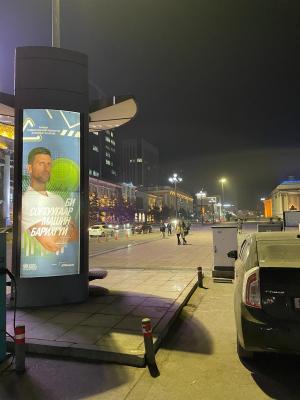
The United Nations Special Envoy for Road Safety, Jean Todt, will visit Mongolia from 27 to 30 March to launch the new UN global campaign for road safety #MakeASafetySatement, in partnership with JCDecaux. The event will be hosted by the Mongolian Government, with the objective to contributing to the implementation of the Global Plan for the Decade of Action for Road Safety 2021-2030, which aims to halve the number of victims on the road by 2030. The Special Envoy will meet at this occasion respective high-ranking officials and representatives of the public and private sector, and civil society.
The new World Health Organization (WHO) Global status report on road safety 2023, highlights that, despite notable progress since 2018 in reducing fatalities, 25% of all road traffic fatalities occur in the Asia Pacific region, representing in terms of absolute numbers, the second highest world number of fatalities on the road, right after South-East Asia. The region reported 15.4 deaths per 100 000 population due to road traffic crashes, three times higher than the European average of 5/100,000 (WHO 2023).
According to the World Health Organization, the mortality rate in Mongolia is 12 per 100,000 inhabitants (WHO 2023). Road crashes represent one of the main causes of fatalities in the country, especially among young men (WHO 2019). In 2013, the Ministry of Road and Transportation of Mongolia reported over 25,000 road accidents, with 550 of them tragically resulting in fatalities.
“Despite progress in Mongolia and in the region, road crashes remain a health public issue to be addressed urgently. Raising awareness is part of the solution and I am glad that Mongolia will host the launch of the global UN-JCDecaux Campaign for road safety. It will be a starting point to promote behaviours saving lives on the road such as wearing a seat belt, not driving under the influence, reducing speed, not texting and driving, not driving tired, or wearing a helmet responding to UN regulations," highlights the Special Envoy.
The UN in Mongolia expresses concern regarding road safety behaviours both in Ulaanbaatar and across the country, as there were 953 reported road injuries involving children in 2023. Sadly, these accidents resulted in the loss of 53 young lives, according to the Ministry.
“We welcome the “Make a Safety Statement” campaign by the Special Envoy for Road Safety. Urgent action is imperative to curb the alarming rate of road accident fatalities and safeguard our children” said Mr. Tapan Mishra, UN Resident Coordinator.
#MakeASafetyStatement
The launch of the United Nations Global Campaign for Road Safety - #MakeASafetyStatement - in Mongolia, is part an effort to raise public awareness of life-saving gestures on the road. This event will cover the whole of Mongolia. Thanks to a global partnership with JCDecaux, the global campaign will appear on billboards and in public places in around 1,000 cities in 80 countries by the end of 2025.
Under the slogan #MakeASafetyStatement, the campaign brings together celebrities worldwide, including Michelle Yeoh, Kylie Minogue, Naomi Campbell, Didier Drogba and Novak Djokovic to encourage users to adopt simple, effective rules to keep their roads safe.
Risk factors that are too often neglected
Only six countries in the world have laws that comply with the World Health Organization (WHO 2023) best practices for all the risk factors - speeding, driving under the influence or distracted driving, use of UN-standard motorbike helmets, and use of seatbelts and child restraints.
In Mongolia, there are still important areas to work on to improve road safety such as reinforcing the legislation on child restraints systems, or promoting the use of helmets responding to the UN minimum safety standards which can reduce the risk injury by up to 69%.
Vulnerable road users
Road traffic deaths and injuries remain a major global health and development challenge. Road traffic crashes are the leading killer of children and youth aged 5 to 29 years and are the 12th leading cause of death when all ages are considered.
Vulnerable road users such as pedestrians, cyclists and motorcyclists remain dangerously exposed. According to the World Health Organization (WHO 2023), nearly 80% of all roads assessed do not meet a minimum 3-star rating for pedestrian safety, and as cyclist fatalities increase, just 0.2% of all roads assessed have cycle lanes. This is especially concerning given that pedestrians and cyclists tend to be the most vulnerable road users and, in most countries, represent the economically most disadvantaged.
In Mongolia, the continuous growth of urban residents has resulted in rapid increase of transport activities and private vehicle ownership. Offering safe alternatives to individuals use of powered vehicles, by designing pedestrians and bicycles lanes, or in developing safe and clean public transport is now crucial in Ulaanbaatar where or over 50% of total population live.
An economic and development issue
Poor road safety conditions affect the world's poorest people the most, especially women and youth, and deprive them of access to education, work, health, basic and cultural services.
In addition to the human tragedy, road crashes trap countries into a vicious circle of poverty. Some estimates put the global macroeconomic cost of road traffic injuries as high as US$ $1.8 trillion (WHO 2023). According to the World Bank, the cost of road crashes represents 5.4 % of GDP (WB 2016) in Mongolia. As such, road traffic injuries are an important health and development challenge. Another reason to rethink mobility and to invest in road safety.

